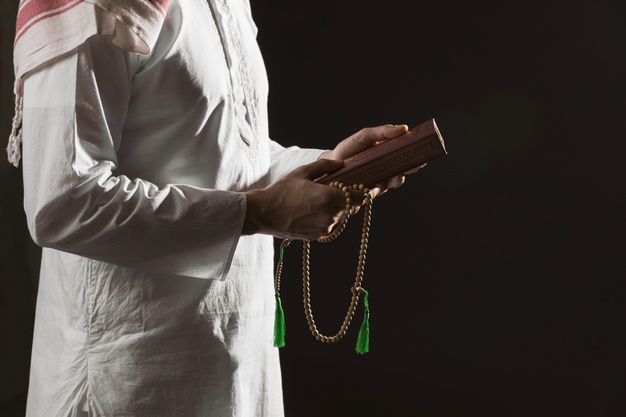Kapanlagi.com - For Muslims, tasbih reading that sounds "subhanallah" is certainly not unfamiliar. Almost every day, every Muslim recites it in various occasions and conditions. Tasbih reading is also one of the phrases uttered during dhikr. However, the reality is that many are still unfamiliar with the meaning of subhanallah.
Subhanallah means so noble, so it is suitable to be frequently uttered daily. There are also many people who assume that the meaning of subhanallah is the same as the meaning of masyallah. However, both have different meanings. In addition, although both are intended to praise, subhanallah and masyallah are used in different situations.
What is the explanation? Summarized from various sources, here is a review of the meaning of subhanallah, as well as its differences with masyallah.
1. Meaning of Subhanallah

(credit: freepik)
Subhanallah is one of the expressions frequently uttered by Muslims. Subhanallah or the phrase of tasbih is also one of the recitations in dhikr. In terms of language, the meaning of subhanallah is 'Glory be to Allah'. Based on this meaning, subhanallah signifies praise to Allah SWT by referring to Him as 'The Most Holy'.
2. The Use of Subhanallah
Besides when reciting dhikr, people also often say subhanallah in certain situations. Because the meaning of subhanallah is praise, some people often say it when they feel amazed or stunned by something. For example, in the beauty of nature or in certain phenomena or when receiving good news.
Not many people know that actually the Prophet Muhammad recommended the utterance of subhanallah only in specific situations. Not when feeling amazed, but on the contrary, when experiencing or encountering something bad. This is as explained by Prophet Muhammad in one of his hadiths as follows:
"A hadith was narrated to us in Sahih Bukhari and Muslim from Abu Hurairah RA that one day Prophet Muhammad SAW met him while he was still in a state of major ritual impurity on a road in Madinah. Abu Hurairah then secretly left the Prophet and performed ablution. Prophet Muhammad SAW himself searched for where his companion had disappeared." Where were you earlier, Abu Hurairah? asked Rasulullah SAW after Abu Hurairah came. When we met earlier, I was still in a state of janabah, O Rasul. 'I refuse to sit with you until I have taken a bath,' Abu Hurairah replied. Subhanallah, a believer is not impure" (HR.Tirmizi).
However, in reality, there is no rule that truly obliges a Muslim to say subhanallah only when experiencing something bad. Because, no matter the meaning, subhanallah is so noble that it can be said at any time to glorify the name of Allah SWT.
3. Subhanallah in Dhikr and the Benefits of Remembrance

(credit: freepik)
As mentioned earlier, subhanallah is one of the recitations in dhikr. Dhikr is an act of worship performed by Muslims to mention and remember the name of Allah SWT. The command regarding dhikr comes directly from Allah SWT through one of the verses in the Quran. The excerpt from the verse has the following meaning:
'So be patient over what they say and exalt [Allah] with praise of your Lord before the rising of the sun and before its setting' (Surah Ta-Ha, Verse 130).
The phrase of tasbih or subhanallah is one of the recitations in dhikr. By uttering it during dhikr, a Muslim will always remember Allah SWT as the Most Holy Being. The recommendation to engage in dhikr is also found in Surah Al-Ankabut, verse 29. The excerpt from the verse means:
'Indeed, remembrance of Allah is greater than worshiping [anything] other than Him' (Surah Al-Ankabut, verse 29).
Based on this verse, dhikr is considered one of the primary acts of worship. This is reasonable because dhikr can provide many benefits for the daily life of a Muslim. The benefits of dhikr are as follows:
1. Remembering Allah SWT.
2. Softening the heart and emotions.
3. Erasing sins.
4. Calming the heart and soothing the mind.
5. Protection from the temptation of Satan.
6. Protection from the fire of Hell.
7. Lightening the burden of life.
4. Difference between Subhanallah and Masyallah

(credit: freepik)
In everyday life, many people mistakenly or interchangeably pronounce the words subhanallah and masyallah. However, the meaning of subhanallah is different from masyallah. Therefore, their usage will also be different. Therefore, Muslims should understand the true meaning of both.
The meaning of subhanallah is 'Glorious is Allah', while the meaning of masyallah is 'what Allah wants, then that is what happens'. At first glance, both sentences are equally suitable for expressing admiration for Allah SWT. However, upon closer examination, masyallah is more like a prayer that should be offered when someone feels helpless in the face of something extraordinary.
Those are some explanations about the meaning of subhanallah and its position in dhikr, as well as its differences from masyallah. Hopefully, it is beneficial and can increase knowledge and faith as a Muslim.
(kpl/psp)
Disclaimer: This translation from Bahasa Indonesia to English has been generated by Artificial Intelligence.















